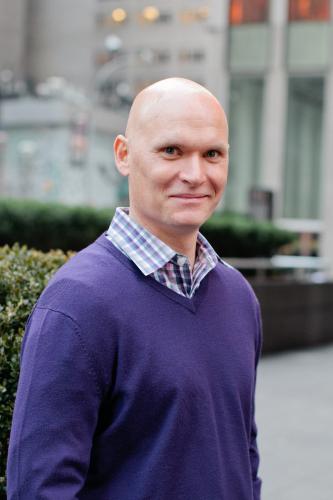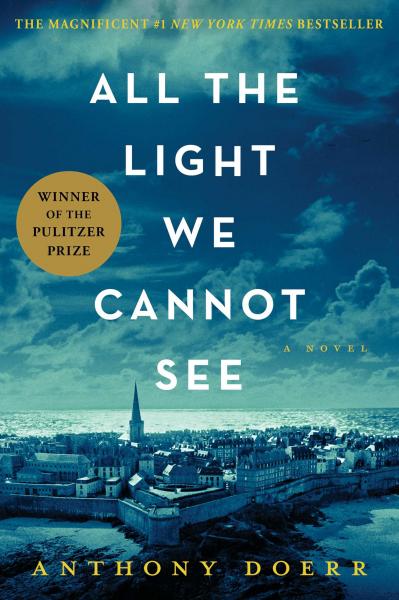- Categories:
Indies Choice Winner Anthony Doerr on All the Light We Cannot See and the Support of Indies
- By Liz Button
 Pulitzer Prize-winning author Anthony Doerr will be present to accept the 2015 Indies Choice Book of the Year Award for Fiction at the American Booksellers Association’s 15th annual Celebration of Bookselling and Author Awards Luncheon, to be held on May 28 at BookExpo America.
Pulitzer Prize-winning author Anthony Doerr will be present to accept the 2015 Indies Choice Book of the Year Award for Fiction at the American Booksellers Association’s 15th annual Celebration of Bookselling and Author Awards Luncheon, to be held on May 28 at BookExpo America.
Even prior to its Indies Choice win, independent booksellers provided early and strong support to Doerr’s All the Light We Cannot See (Scribner), with positive buzz beginning at the 2014 Winter Institute in Seattle and building to the novel being named the #1 Indie Next List pick for May 2014.
Since then, Doerr’s book has shot to critical and popular success, remaining on the New York Times Bestseller List since publication and appearing on the New York Times Book Review’s list of The 10 Best Books of 2014. In October 2014, All the Light We Cannot See became a National Book Award finalist, and in April, Doerr was named the winner of the 2015 Pulitzer Prize for Fiction.
In luminous physical detail, the novel tells the epic, intertwining tale of two young people who meet during World War II: Marie-Laure, a blind Parisian girl, and Werner, a German orphan who is enchanted by the inner-workings of a radio he has found.
Doerr recently spoke to Bookselling This Week about the book’s success and the value he places on the continued support of independent booksellers.
Bookselling This Week: Independent bookstores have backed All the Light We Cannot See from the very beginning and named it the #1 Indie Next List pick for May 2014. Since that time, indies have remained strong supporters of the book and recently voted it the winner of the 2015 Indies Choice Book Award in the adult fiction category. What has the support of independent booksellers meant to you?
Anthony Doerr: Everything! This novel would not have reached one-tenth of the readers it has without the support of independent booksellers. They are the ones who have blogged about it, set it in shop windows, hosted me all over the country, and put it into the hands of readers.
 As a short story writer, my books have always been the kind of books that don’t usually find readers unless a bookseller or librarian recommends them. Everywhere I’ve gone in the States, from Washington, D.C., to Bellingham, Washington, when readers tell me how they discovered All the Light, they don’t say it’s because of an event I did, or because the book won a prize, it’s because a friend, librarian, or bookseller convinced them to give the novel a try.
As a short story writer, my books have always been the kind of books that don’t usually find readers unless a bookseller or librarian recommends them. Everywhere I’ve gone in the States, from Washington, D.C., to Bellingham, Washington, when readers tell me how they discovered All the Light, they don’t say it’s because of an event I did, or because the book won a prize, it’s because a friend, librarian, or bookseller convinced them to give the novel a try.
BTW: All the Light We Cannot See has been on the New York Times Bestseller List since it came out and remains at the top of independent bookstore bestseller lists across the nation. Why do you think your book has become universally popular? What is it about this book that speaks to so many people?
AD: I’m not sure I know. There are so many wonderful novels out there! Maybe this book is popular right now because every day we’re losing more people who lived through the Second World War? Or maybe it’s because the novel tries to balance the scale of a human life against the larger time scales of history and geology? Or because sometimes we’re drawn to narratives about scarcity because they remind us of the abundance in our lives? Or because it has extremely short chapters?
BTW: In an interview last year with Bookselling This Week, you said writing this book was a 10-year ordeal. In the future, would you ever consider taking on another project of this magnitude?
AD: Unfortunately, when I start a project, I’m never sure how long it will take or how big it will be — I just start making something and hope it’s something I’ll be able to complete before I die. Most of the time, if you’re pushing yourself to take risks, your projects cave in or fall apart anyway. So I’m rarely in control of how extensive or complicated something gets. But if some future project takes on a complicated structure and requires a few years of research, I’m all for it.
BTW: In addition to widespread popular and critical acclaim, your book has also won numerous prizes, most recently the Pulitzer Prize for Fiction. What has receiving these honors been like for you?
AD: Overwhelming! I’ve been publishing books long enough now to understand how many fascinating, beautiful pieces of work come out every year, and that winning prizes is often a matter of luck.
There are so many terrific fiction writers working right now, even just here in the States, from Stephen Millhauser to Marilynne Robinson to Jim Shepard to Joanna Scott to Karen Russell.
Lily King’s Euphoria is brilliant. So is Jenny Offil’s Dept. of Speculation. So while I’m happy that prizes might help my work find more readers, I’m also aware of the many limitations and shortcomings of my work, and I know I have a long way to go.
BTW: Can you give your fans a hint about any of the writing projects you’re currently working on?
AD: I’m working on three different projects right now, but they’re all so frail that I’m worried if I talk about any of them, they’ll collapse. I’ll keep nursing them in the dark for a bit longer, until I see which of them can stand up on its own.
The Celebration of Bookselling & Author Awards Lunch, which is open exclusively to ABA member booksellers, is currently booked to capacity. Booksellers who would like to add their names to the waitlist can do so here.

